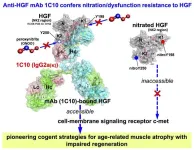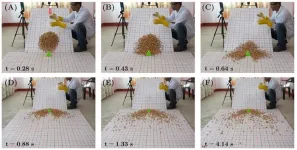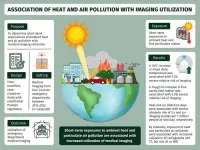(Press-News.org) Even when their parents are lawyers, doctors, or executives, Black Britons are substantially more likely to end up in working class jobs than their White peers, a new study from the University of Kent reveals.
Funded by the Leverhulme Trust, this research shows that Black men from the most advantaged families are three times more likely than White men from similar backgrounds to be in working class jobs beyond age 30. Black women are also twice as likely as White women to experience this kind of downward mobility. This is true even after removing any effect of national origin.
The study, conducted by Dr Robert de Vries and published in Sociological Research Online, shows that advantaged Black families face substantial barriers in maintaining their status across generations. The absence of these barriers for privileged White families means that they are much more likely to pass on their advantage to their children – contributing to persistent racial inequalities in the UK labour market.
The research analysed the occupations of 8,000 men and women whose parents held high-status, professional jobs, using nationally representative data from the UK Labour Force Survey. The findings additionally showed that the increased risk of downward mobility faced by Black women was predominantly explained by lower educational qualifications – suggesting particular barriers in the education system. However, Black men were more likely to be downwardly mobile even after education was taken into account. In fact, Black men from advantaged backgrounds were four times more likely than equally educated White men to end up in working class roles.
Dr Robert de Vries, Senior Lecturer in Quantitative Sociology at Kent’s School of Social Sciences, said: ‘This research shows that even when Black families make it to the top, their children are much more likely to fall back down the social ladder than are the children of privileged White families. This means that racial economic disparities in the UK will not be solved by upward mobility alone. Policy needs to address the barriers that Black Britons, and especially Black men, face in the labour market – even when they have the same qualifications as their White peers.’
The research paper titled ‘Inequalities in the Risk of Multidimensional Downward Mobility From the Most Advantaged Backgrounds’ is published in Sociological Research Online. doi: 10.1177/13607804241281175
END
Black Britons from top backgrounds up to three times more likely to be downwardly mobile
Even when their parents are lawyers, doctors, or executives, Black Britons are substantially more likely to end up in working class jobs than their White peers, a new study from the University of Kent reveals.
2024-11-19
ELSE PRESS RELEASES FROM THIS DATE:
Developing an antibody to combat age-related muscle atrophy
2024-11-19
Fukuoka, Japan—We all age. And while humanity’s life expectancy has increased dramatically in the modern era, we still struggle with the inevitable health issues our bodies face as we get up in the years. For example, the decrease of muscle mass and function, leading to weakness and atrophy. This is a pressing concern in a super-aging society like Japan where—while people live longer—without proper muscle strength, quality of life can be drastically diminished.
In findings that may eventually lead to targeted ...
Brain aging and Alzheimer's: Insights from non-human primates
2024-11-19
“Brain aging is a biological process that comprehends degenerative, adaptive, and regenerative brain changes that elapse through maturity until the elderly.”
BUFFALO, NY- November 19, 2024 – A new review was published in Aging (listed by MEDLINE/PubMed as "Aging (Albany NY)" and "Aging-US" by Web of Science), on October 29, 2024, Volume 16, Issue 20, titled, ”Brain aging and Alzheimer’s disease, a perspective from non-human primates.“
In the review, Ferrer Isidro from the University of Barcelona and Reial Acadèmia de Medicina de Catalunya, explores the differences in ...
Can cells ‘learn’ like brains?
2024-11-19
Individual cells appear capable of learning, a behaviour once deemed exclusive to animals with brains and complex nervous systems, according to the findings of a new study led by researchers at the Centre for Genomic Regulation (CRG) in Barcelona and Harvard Medical School in Boston.
The findings, published today in the journal Current Biology, could represent an important shift in how we view the fundamental units of life.
“Rather than following pre-programmed genetic instructions, cells are elevated to entities equipped ...
How cells get used to the familiar
2024-11-19
A dog learns to sit on command, a person hears and eventually tunes out the hum of a washing machine while reading … The capacity to learn and adapt is central to evolution and, indeed, survival.
Habituation — adaptation’s less-glamorous sibling — involves the lessening response to a stimulus after repeated exposure. Think the need for a third espresso to maintain the same level of concentration you once achieved with a single shot.
Up until recently, habituation — a simple form of learning — was deemed ...
Seemingly “broken” genes in coronaviruses may be essential for viral survival
2024-11-19
Viruses are lean, mean, infection machines. Their genomes are tiny, usually limited to a handful of absolutely essential genes, and they shed extra genomic deadweight extremely fast.
Usually.
Coronaviruses, including SARS-CoV-2 (the virus that causes COVID-19), appear at first glance to be an exception. They have some extra “accessory” genes in addition to the usual minimal viral set, and scientists don’t know what most of them do. Scientists believe these extra genes must be doing something important, though, or they would be rapidly lost as the viruses evolved.
Now, University of Utah Health researchers have found that some of these viral genes have stuck around ...
Improving hurricane modeling with physics-informed machine learning
2024-11-19
WASHINGTON, Nov. 19, 2024 – Hurricanes, or tropical cyclones, can be devastating natural disasters, leveling entire cities and claiming hundreds or thousands of lives. A key aspect of their destructive potential is their unpredictability. Hurricanes are complex weather phenomena, and how strong one will be or where it will make landfall is difficult to estimate.
In a paper published this week in Physics of Fluids, by AIP Publishing, a pair of researchers from the City University of Hong Kong employed machine learning to more accurately model the boundary layer wind field of tropical cyclones.
In atmospheric science, the boundary layer ...
Seed slippage: Champati cha-cha
2024-11-19
WASHINGTON, Nov 19, 2024 – Champatis, the seeds of the Lapsi tree, are valued in Nepal for their medical, economic, social, and cultural significance. They are also popular among children as simple playthings. But for a group of physicists, these unique seeds—and the way they bounce and roll down slopes—could help them better understand landslides and avalanches, leading to research that could save lives.
In a study published this week in Physics of Fluids, by AIP Publishing, a team ...
Hospitalization following outpatient diagnosis of RSV in adults
2024-11-19
About The Study: In this cohort study of adults with outpatient medically attended-respiratory syncytial virus (RSV) infections from 3 large deidentified U.S. databases across 6 RSV seasons, approximately 1 in 20 adults experienced all-cause hospitalization within 28 days. The results of this study highlight the public health need for RSV prevention and treatment.
Corresponding Author: To contact the corresponding author, Joshua T. Swan, PharmD, MPH, email swan.joshua@gmail.com.
To access the embargoed study: Visit our For The Media ...
Beyond backlash: how feeling threatened by diversity can trigger positive change
2024-11-19
In recent years, employers across North America have introduced or boosted equity, diversity and inclusion (EDI) programs in hopes of creating a more diverse and inclusive workplace culture.
But studies have shown that fostering diversity can come with a steep cost, as employees from dominant groups often felt threatened, leading to a backlash against the very groups the employers are seeking to support.
But could those feelings of threat also lead to learning and change, and eventually allyship? ...
Climate change exposure associated with increased emergency imaging
2024-11-19
OAK BROOK, Ill. – Using data collected over a 10-year period from four emergency departments, researchers at the University of Toronto found that short-term exposure to ambient heat and air pollution levels was associated with increased utilization of X-rays and computed tomography (CT). Results of the study were published today in Radiology, a journal of the Radiological Society of North America (RSNA).
“Extreme climate exposures are associated with higher demand for health care including emergency department visits,” ...
LAST 30 PRESS RELEASES:
Korea University, Stanford University, and IESGA launch Water Sustainability Index to combat ESG greenwashing
Molecular glue discovery: large scale instead of lucky strike
Insulin resistance predictor highlights cancer connection
Explaining next-generation solar cells
Slippery ions create a smoother path to blue energy
Magnetic resonance imaging opens the door to better treatments for underdiagnosed atypical Parkinsonisms
National poll finds gaps in community preparedness for teen cardiac emergencies
One strategy to block both drug-resistant bacteria and influenza: new broad-spectrum infection prevention approach validated
Survey: 3 in 4 skip physical therapy homework, stunting progress
College students who spend hours on social media are more likely to be lonely – national US study
Evidence behind intermittent fasting for weight loss fails to match hype
How AI tools like DeepSeek are transforming emotional and mental health care of Chinese youth
Study finds link between sugary drinks and anxiety in young people
Scientists show how to predict world’s deadly scorpion hotspots
ASU researchers to lead AAAS panel on water insecurity in the United States
ASU professor Anne Stone to present at AAAS Conference in Phoenix on ancient origins of modern disease
Proposals for exploring viruses and skin as the next experimental quantum frontiers share US$30,000 science award
ASU researchers showcase scalable tech solutions for older adults living alone with cognitive decline at AAAS 2026
Scientists identify smooth regional trends in fruit fly survival strategies
Antipathy toward snakes? Your parents likely talked you into that at an early age
Sylvester Cancer Tip Sheet for Feb. 2026
Online exposure to medical misinformation concentrated among older adults
Telehealth improves access to genetic services for adult survivors of childhood cancers
Outdated mortality benchmarks risk missing early signs of famine and delay recognizing mass starvation
Newly discovered bacterium converts carbon dioxide into chemicals using electricity
Flipping and reversing mini-proteins could improve disease treatment
Scientists reveal major hidden source of atmospheric nitrogen pollution in fragile lake basin
Biochar emerges as a powerful tool for soil carbon neutrality and climate mitigation
Tiny cell messengers show big promise for safer protein and gene delivery
AMS releases statement regarding the decision to rescind EPA’s 2009 Endangerment Finding
[Press-News.org] Black Britons from top backgrounds up to three times more likely to be downwardly mobileEven when their parents are lawyers, doctors, or executives, Black Britons are substantially more likely to end up in working class jobs than their White peers, a new study from the University of Kent reveals.






